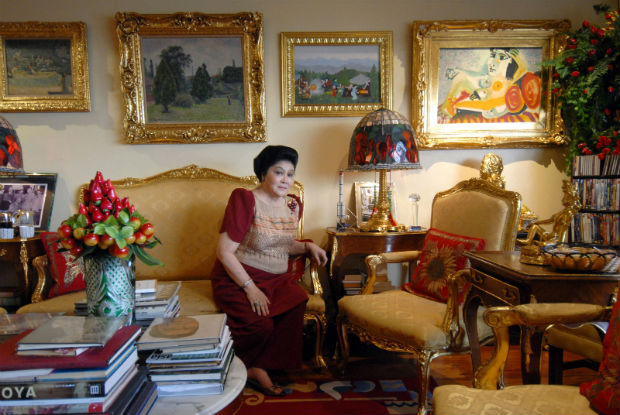Hunt on for missing Marcos paintings

This file photo taken on June 7, 2007 shows former first lady Imelda Marcos is seen in her apartment in Manila with a gallery of paintings including a Picasso, seen at upper right. AFP FILE PHOTO/ROMEO GACAD
The Presidential Commission on Good Government (PCGG) will seek the public’s help in the recovery of at least 200 missing art works, including paintings by Van Gogh, Picasso, Monet, Rembrandt and Michelangelo that were owned by former first lady Imelda Marcos, as experts concluded yesterday the appraisal of the Marcos jewelry collections seized nearly three decades ago.
PCGG Commissioner Andrew de Castro said they would launch a website next month where the public can provide tips on the whereabouts of the masterpieces that went missing following the ouster of President Ferdinand Marcos in the February 1986 Edsa revolt.
De Castro said the PCGG wanted to inform the public about the art treasures so they could help track them down. The missing artworks are believed to have been bought using government funds during the Marcos dictatorship.
Hundreds of artworks by the masters were identified as missing by the PCGG which was tasked to recover the ill-gotten wealth of the Marcoses and their cronies, since only their receipts and frames were left in the offices where the paintings were kept, such as in Malacañang Palace and a New York townhouse.
Some of the paintings were found to have been sold in the black market, most recently by Vilma Bautista, Imelda’s former aide. Bautista was sentenced to jail in the United States last year for conspiracy and tax fraud in the $43-million sale of Monet’s “Le Bassin aux Nymphéas.”
Currently, De Castro said the PCGG has an agreement with various international experts to alert them if there are attempts to sell the missing paintings. He added that by having the website, the public would know the details of the paintings and, through their “goodwill” and “love of country,” help the government recover them.
This development came after auction houses Christie’s and Sotheby’s wrapped up their five-day appraisal of the Marcoses’ three jewelry collections, namely, the Malacañang, Hawaii and Roumeliotes collections.
Of the three collections, only the Malacañang collection, composed of around 400 pieces of jewelry left in the Palace, remain in dispute.
The Sandiganbayan ruled last year that this particular collection, being ill-gotten, belongs to the government. Imelda, however, had appealed the ruling with the Supreme Court.
The PCGG official said they would have to wait for at least two weeks before the auction houses hand to them the appraisal results of the jewelry collections, valued in 1991 at between $6 million and $8 million (P282 million and P376 million).
He added that as soon as they get the results, they would write the Privatization Council, led by the Department of Finance, to get its recommendation on whether it will go ahead with the auction or exhibition of the jewelry pieces.
De Castro said they remained hopeful they would be able to hold an exhibit of the jewelry pieces in time for PCGG’s 30th anniversary in February next year. He noted that one of the challenges in holding the exhibit was the insurance cost for the collection.